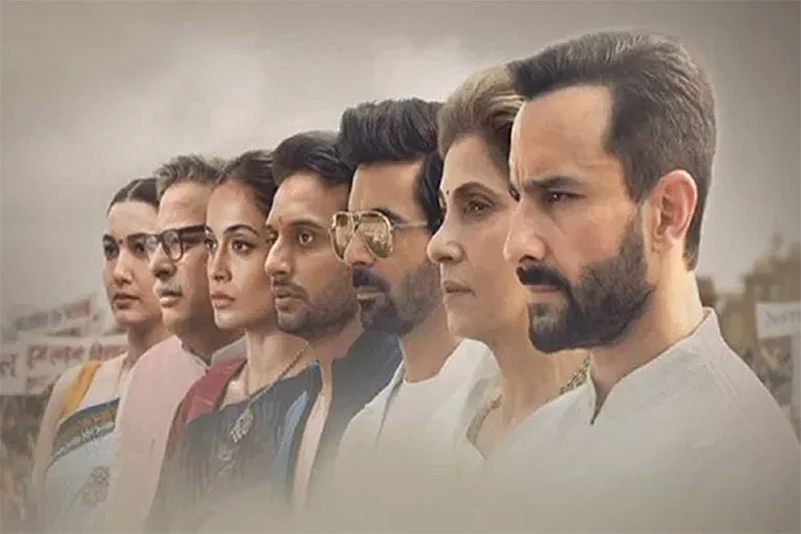A recent investigation by The Washington Post revealed that the OTT industry is allegedly facing high pressures when greenlighting projects with political or religious themes in fear they may evoke strong sentiments from India's ruling party.
In recent years, there has been a discernible shift in the content accepted by the streaming industry in India. This transformation is often hinted towards political constraints in the years of the ruling Union government, signalling a notable change in the type of content permitted within this evolving landscape.
There have been numerous appeals for the boycott of web series and movies both on OTT and in cinemas that have resonated with discontent among certain religious communities and political groups due to certain scenes considered vulgar or offensive to their sentiments. The increasing censorship has hindered the creative freedom of actors and filmmakers, with repeated scrutiny from lawmakers and the public.
The Washington Post report provided intricate details about various projects based on interviews conducted with over two dozen filmmakers, writers, producers, and executives in both India and the United States who shared their insights and experiences.
Indian filmmaker Anurag Kashyap, who spoke to the Post in 2021, narrated his ordeal and the frustration of "invisible censorship" on streaming platforms when Netflix decided not to move forward with what could have been a career-defining project — his adaptation of the nonfiction book "Maximum City”, which explores the themes of “Hindu bigotry and the extremes of hope and despair in Mumbai”.
“It was my best work,” he told The Washington Post. “I’ve never done such honest, important work.”
Kashyap was given no clear reason by Netflix for shelving “Maximum City” but he believes it was either because the content was too sensitive or it was his honest and outspoken personality they had a problem with.
Streaming “was finally the space I was waiting for,” Kashyap said. “The disappointment is it was supposed to be a revolution, but it was not. Like social media, it was supposed to empower people, but it became a tool.”
OTT Projects That Faced Censorship
Tandav
The Amazon Prime Video original political saga starring some big names like Saif Ali Khan, Dimple Kapadia and Zeeshan Ayyub, among others, had a spate of FIRs registered against it for allegedly hurting religious sentiments by mocking a Hindu God. The controversy deepened with additional allegations of casteist scenes depicting Dalits negatively.
According to The Washington Post, the situation was such that “a top Prime Video executive in India was forced to briefly go into hiding and surrender her passport to police, according to people familiar with the matter.”
The contentious scenes were removed from the series and many more adjustments were made on recommendation by the Ministry of Information and Broadcasting. Director Ali Abbas Zafar also issued a public apology. “The cast and crew of ‘Tandav’ take cognizance of the concerns expressed by the people and unconditionally apologise if it has unintentionally hurt anybody’s sentiments,” the statement read.
Sacred Games
Sacred Games was the first series of its kind. It wasn’t the conventional Bollywood production with synchronised dances, it was a gritty crime drama. Netflix's first Indian original series, though successful, faced criticism for allegedly portraying former Indian Prime Minister Rajiv Gandhi negatively. Some viewers raised concerns about the depiction of a scene where the lead actor, Saif Ali Khan, throws his kada into the sea, citing it as offensive to Sikh sentiments. Additionally, others contested the show's accuracy in portraying historical events.
Sacred Games co-director Anurag Kashyap said in an interview that Netflix had pulled the plug on the third season of the show because they were fearful of a similar fate after the Tandav controversy.
Suitable Boy
The adaptation of Vikram Seth's novel "A Suitable Boy" faced criticism from Bharatiya Janata Party politicians due to a scene depicting the Hindu protagonist, Lata, kissing a Muslim boy in a temple. There were calls for Netflix to remove the scenes and issue an apology for encouraging “love jihad”.
Madhya Pradesh Home Minister Narottam Mishra was one of the complainants. He said in a tweet, “A film titled ‘A Suitable Boy’ has been released on an OTT platform. It depicts extremely objectionable scenes that hurt the feelings of a particular religion. I have directed police officials to look into it.”
Gormint
According to the The Washington Post investigation, Gormint was the first show to be dropped after the Tandav controversy. Despite having all nine episodes of the satirical show, which humorously portrayed the absurdities of Indian politics, fully shot and ready for streaming, the series vanished without a trace.
The director, who wished to remain anonymous, said he didn’t begrudge Prime Video executives because they faced enormous personal risks, but he bemoaned the state of the industry. “It is creative evolution in reverse,” he said. “Only passive, thoroughly sanitized content stands a chance on most platforms now.”
Several other OTT projects have faced criticism for various reasons. Amazon Prime Video's "Fire" drew scrutiny for its portrayal of a same-sex relationship between two women. Ekta Kapoor's "XXX" faced backlash for depicting wives of Indian Army soldiers in an objectionable manner, while "Pataal Lok" allegedly used a BJP MLA's photograph without permission.
What OTT Platforms Are Saying
According to The Washington Post report, Prime Video India praised the Indian government’s current streaming regulations for “allowing creativity in the content we create” and said the company’s programming decisions are “designed to serve our incredibly diverse audiences in India.”
Meanwhile, Netflix said, “We have an incredibly broad range of Indian original films and TV shows, all of which speak to our long standing support for creative expression. This diversity not only reflects our members’ very different tastes, it also distinguishes our service from the competition.”


























